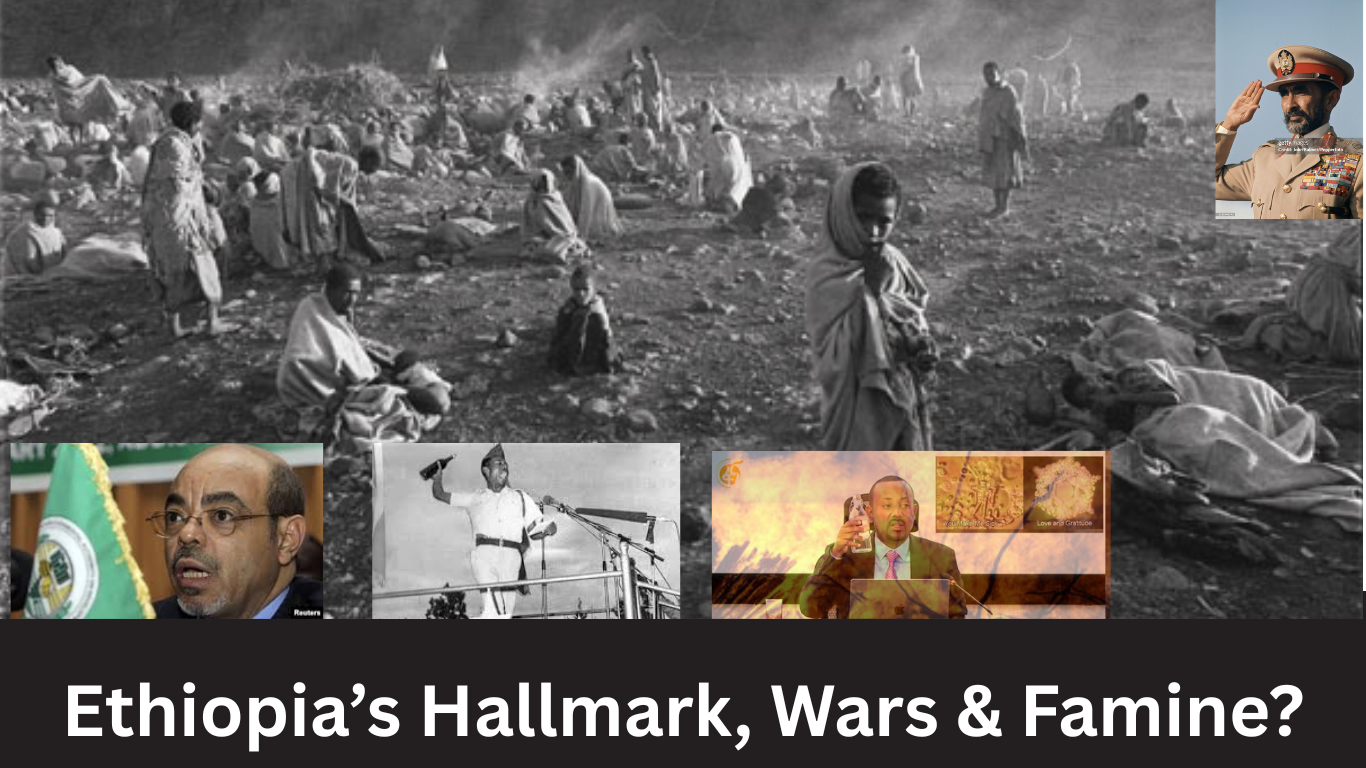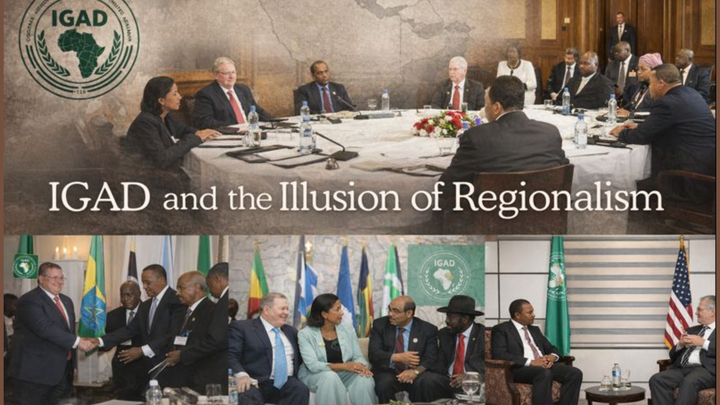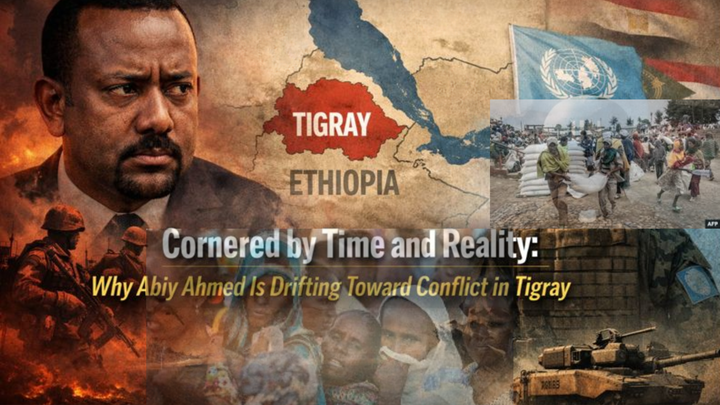The Final Offensive: Why Eritrea Must Seize Its Moment to End the Ethiopian Threat
A forceful call for Eritrea to seize a historic opening, neutralize the Ethiopian threat, and secure lasting sovereignty through decisive political and defensive measures

By Amanuel Biedemariam 9/22/2025
Since the end of WWII, for over 80 years, the Eritrean national project has been defined by a single, relentless struggle: to exist, sovereign and secure, free from the hegemonic ambitions of successive Ethiopian regimes handled by foreign actors.
This is not a political preference; it is the foundational axis around which all Eritrean life rotates. From the bitter decades of armed struggle to the costly victory in 1991, and through the devastating betrayal of the 1998 border war and the subsequent twenty-five-year siege, the nature of the threat has changed its face but never its intent.
Under Abiy Ahmed, Ethiopia and its backers have once more exposed their intentions through unprovoked threats and expansionist demands for sea access. Ethiopia’s repeated claims and threats to seize Assab by force amount to a de-facto declaration of war; Eritrea therefore reserves the right to respond with decisive action to protect its sovereignty and territorial integrity. Yet today Ethiopia is weakened, fractured, and bleeding from self-inflicted wounds — while Eritrea occupies the strategic advantage. To accept another prolonged “no war, no peace” stalemate is to condemn a new generation to sacrifice. The only logical, strategic, and necessary course is to finish what began in 1991: Eritrea must take decisive steps to bring about political change in Addis Ababa that will finally and permanently neutralize the Ethiopian threat.
The historical precedent for this action is etched in blood and victory. The 1991 triumph was not merely an independence struggle; it was a masterclass in revolutionary strategy that remains unique in the annals of African and world history. The Eritrean People’s Liberation Front (EPLF) did not just defeat the Derg’s army on the field of battle—it orchestrated the downfall of the regime itself, ensuring that the new government in Addis Ababa was born from an alliance that respected Eritrea’s right to exist.
This was a profound understanding of realpolitik: independence is not granted; it is taken and then secured by controlling the geopolitical environment. The EPLF’s critical restraint after victory, choosing not to dismantle Ethiopia but to allow a friendly government to form, demonstrated a strategic maturity that preserved regional stability. However, the subsequent betrayal by the TPLF, the war of 1998, and Ethiopia’s refusal to honor the border demarcation proved that the 1991 solution, while brilliant, was incomplete. The cancer of Ethiopian hegemony was not fully excised; it merely metastasized.
Today, the conditions are ripe to complete that mission. Prime Minister Abiy Ahmed’s Ethiopia is a phantom of a state—a hollowed-out central power besieged by a hydra of its own creation. The war in Tigray has shattered the myth of a unified Ethiopia, awakening ancient ethnic nationalism and arming a multitude of factions from Amhara, Oromia, Afar and Ogaden who have seen the true cost of Abiy’s feudal ambitions.
His reckless and unprovoked declarations regarding access to the Red Sea are not the statements of a strong leader but the desperate gambits of a weak one, designed to rally internal support through external aggression. They are a clear signal that the eternal Ethiopian ambition to control Eritrea remains state policy. But this time, Addis Ababa stands alone. Its army is depleted, constantly at war with their brethren, and, according to major reports, defecting in large numbers; its economy is in shambles, and its political capital on the world stage is exhausted. More importantly, the very regions Abiy needs to control are in open or simmering rebellion against him.
This is where Eritrea’s superior grasp of the Horn’s complex tapestry becomes the decisive weapon. To view this conflict through a simplistic lens of Asmara versus Addis is to misunderstand the battlefield entirely. Eritrea is not facing a monolithic Ethiopia; it is facing a regime in death throes, surrounded by a constellation of powerful Ethiopian factions who are equally, if not more, fed up with Abiy Ahmed’s government.
Eritrea’s decades of experience, its intelligence networks, and its deep understanding of the grievances of every major ethnic group provide it with unparalleled influence. This is not about foreign manipulation; it is about strategic alignment. By leveraging these internal divisions, Eritrea can help catalyze the inevitable downfall of the Abiy regime, ensuring that the resulting power structure in Ethiopia is either too fragmented to pose a threat or, ideally, led by elements who understand that peace with Eritrea is a prerequisite for their own survival.
The argument against this course of action—the fear of international condemnation or the risk of a failed Ethiopian state—is a luxury of thought borne of a privilege that Eritrea has never had. The last twenty-five years of hard national service by every Eritrean, economic isolation, and generational sacrifice are the direct cost.
Thus, defending the status quo is tantamount to endorsing another twenty-five years of the same suffering. The West, the African Union, and other international actors — who have repeatedly failed to understand or protect Eritrea’s interests and have tacitly accepted Ethiopia’s transgressions — offer no solutions, only complications and silence in the face of ongoing Ethiopian aggression..
The aim isn't to occupy Ethiopia, but to free both nations from the endless cycle of conflict by dismantling the regime that sustains it. A decentralized Ethiopia—where each region governs itself—is far less of a threat than a centralized, revanchist state in Addis Ababa, fixated on regaining access to the sea. For decades, successive Ethiopian regimes have pursued regime change in Eritrea, exploiting Eritreans and offering them platforms to operate within Ethiopia. It's time to shift direction. Establishing a government-in-exile for Ethiopia—where every autonomous region has one vote—would enable cooperation on economic and security matters, laying the foundation for peaceful coexistence.
The time is now. The unprovoked threats from Addis Ababa are not a challenge; they are an invitation to end this, once and for all. President Isaias Afwerki and the Eritrean leadership, who have steered the nation through unimaginable challenges with unwavering resolve, have a historic opportunity to deliver the final, decisive victory.
This is the nail in the coffin of Ethiopian aggression. By acting decisively now, Eritrea can secure a century of peace and finally allow its people to build a nation not under the shadow of perpetual threat, but in the bright light of hard-won, and permanent, security. The struggle must continue until the threat is finished. To do anything less would be a betrayal of every sacrifice paid since 1961.




Comments ()